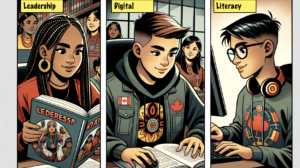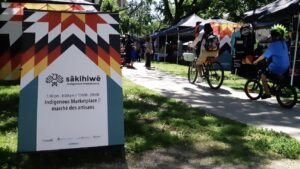This week we are going to learn about artificial intelligence and some of its many intersections with food security. As part of our capacity building activities with the new Youth, Arts and Media Team this summer, we’re diving into how AI can contribute to solving some of the most pressing global challenges, including ensuring that everyone has access to enough nutritious food. This is how we want to do things with our program.
What is artificial intelligence?
Artificial intelligence, or AI, refers to the capability of machines to perform tasks that typically require human intelligence. This can include learning from data, recognizing patterns, making decisions, and even understanding natural language. In the context of food security, AI can be a game changer. It can help predict crop yields, optimize resource use, and even monitor supply chains to reduce waste and improve efficiency. These are some of the areas we want to explore in this year’s fall and winter programming— how can we leverage the best tools available to make a tangible difference?
Our program is building from the ground up, and AI is playing a crucial role in advancing our learning. But our program isn’t just a great big collective (or framework) of organizations, programs, academia, businesses and industry — Youth are driving this program by bolstering their digital and data literacy skills, which are integral for life skills in arts, cultural and food sector entrepreneurship. They are actively involved in communicating activities and outcomes. In making sure our program is truly built from the ground up, we ensure that our next generation is well-equipped to address future challenges with informed, innovative solutions.
What is predictive modelling?
One of the most fascinating applications of AI in food security is called predictive modeling. It involves analyzing vast amounts of data from things like weather patterns, soil conditions, and crop health. AI systems can use this information to provide farmers with insights on the best times to plant and harvest crops and to plan ahead. This can maximize yield and minimize the risk of crop failure due to unforeseen environmental conditions. For example, AI systems have been successfully used in India to predict and mitigate the impact of droughts on crop production, securing food supplies for millions. This is how we want to do things—by applying innovation where it’s needed most.
The use of AI in food security isn’t just about deploying sophisticated technologies. It is equally important to ensure that these technologies are used ethically and responsibly. This brings us to resources like the guiding principles from organizations like the Government of Canada. These guidelines are designed to help ensure the effective and ethical use of AI. Firstly, it’s essential to be open about how, why, and when AI is being used. This is because transparency builds trust and helps people understand the benefits and potential risks of AI.
AI systems should prioritize the needs of individuals and communities, including Red River Metis, First Nation and Inuit peoples. This means considering the broader societal benefits of AI and not just the technological advancements. The data used by AI systems must be lawfully collected, ensuring that issues around privacy and intellectual property rights are respected. AI systems should also be designed to minimize biases and inaccuracies, and it should be clear when an AI system is making decisions rather than a human. This is how we want to do things—by placing ethics and integrity at the forefront.
How are we using these tools, technologies and approaches?
As a program and collective, we’re building our program from an arts-based foundation, focusing on learning intervention design, delivery, and evaluation as we grow. This emphasis on creative approaches enhances our understanding and ensures that our activities are inclusive and engaging. Integrating AI into our projects helps us overcome capacity challenges, and helps us more effectively communicate the importance of food security while fostering a more connected and informed community.
Ultimately, our goal is to use AI not just to enhance technological capabilities and to address capacity challenges, but to genuinely improve lives and the way we work with communities. The intersection of AI and food security is a rich area for further exploration, and we’re excited to see how these technologies can help address one of humanity’s most fundamental needs: access to food.
As we continue this journey, we’ll delve into specific tools, case studies, and the ethical considerations every Friday, so stay tuned for more insights and exciting developments in this space! This is how we want to do things—thoughtfully, responsibly, and with a clear vision for a better future.
See you next week.
About our summer programming
This year’s Youth, Arts and Media Team summer activities are supported by Global Dignity Canada, and with funding from Innovation, Science and Economic Development Canada. Manitoba Agriculture, the Minneapolis College of Art and Design, and the Sustainable Canadian Agricultural Partnership, the OpenAI Researcher Access Program, Agri-Food and Agriculture Canada and the Government of Canada’s Youth Employment Skills Program. We thank them for supporting our youth and programs.










